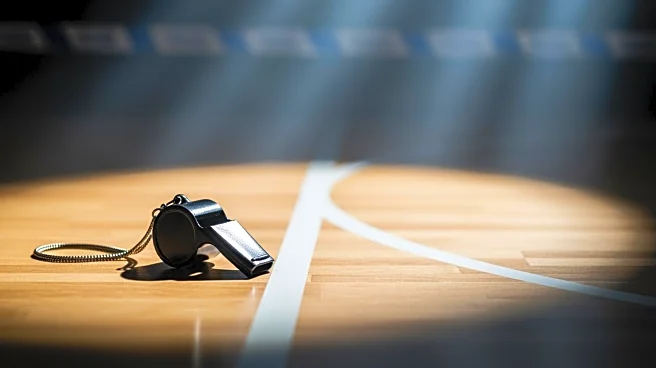What's Happening?
Bryce James, the youngest son of basketball star LeBron James, has not yet made his debut for the University of Arizona men's basketball team. Despite Arizona's 93-67 victory over Utah Tech, Bryce did not play, continuing a trend from the team's previous
game against Florida. Bryce James, a freshman guard and a consensus three-star recruit, is still working to earn a spot in the team's rotation. Head coach Tommy Lloyd has stated that Bryce's development will not be influenced by his father's legacy, emphasizing the importance of treating him like any other player. Lloyd has urged fans and media to allow Bryce to integrate naturally with the team, highlighting the player's desire to be seen as a normal college student.
Why It's Important?
Bryce James' journey in college basketball is significant due to his father's high-profile status in the sport. His development and integration into the team are closely watched by fans and media, which can add pressure to his collegiate career. Coach Lloyd's approach to treating Bryce as a regular player is crucial for his personal growth and mental well-being, allowing him to develop his skills without the burden of external expectations. This situation underscores the challenges faced by children of celebrities in pursuing their own paths, particularly in sports where legacy can heavily influence perception and opportunities.
What's Next?
As Bryce James continues to work towards earning playing time, his progress will be closely monitored by both the coaching staff and the public. Coach Lloyd's commitment to treating Bryce like any other player suggests that his inclusion in the rotation will depend solely on his performance and readiness. The team's upcoming games will provide further opportunities for Bryce to showcase his abilities and potentially secure a spot in the lineup. The focus will remain on his development as a player, independent of his father's legacy.
Beyond the Headlines
The situation with Bryce James highlights broader themes of identity and individuality for children of famous parents. It raises questions about how public figures can balance their personal aspirations with the expectations tied to their family name. This scenario also reflects on the role of media and public perception in shaping the experiences of young athletes, emphasizing the need for supportive environments that prioritize personal growth over celebrity status.















